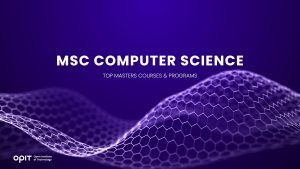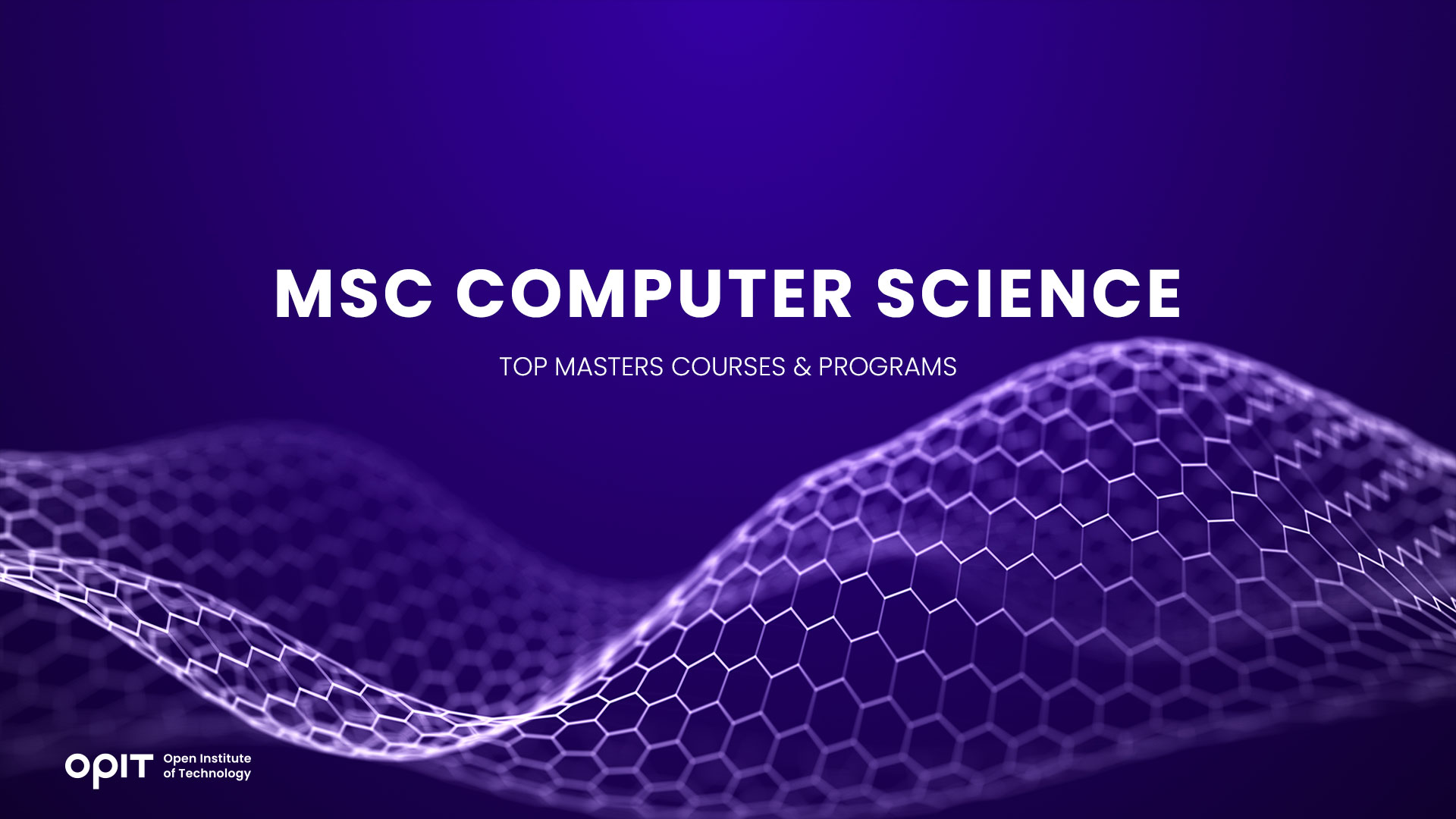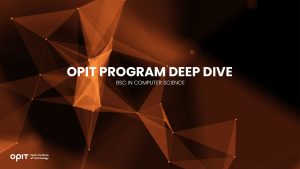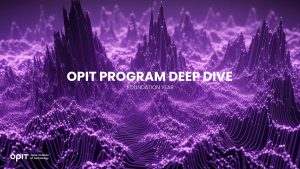

Finding an industry or even area of life that doesn’t utilize digital technologies is quite a challenge today. As computers continue to impact the ways we do business and live, understanding their capabilities and limitations becomes essential. This is the gist of what computer science is all about.
The tasks of computer science keep growing in scope and complexity. This means the demand for professionals in the field is always on the rise. Global companies are always on the lookout not only for people who know computer science but are also experts in the field.
For these reasons, getting an MSc in Computer Science can be the best career move in the modern landscape. Masters in Computer Science allows you to gain detailed knowledge and choose a specialized path. Better yet, holding such a degree elevates your chances of landing a well-paid job at a respectable organization.
Getting an MSc Computer Science is undoubtedly a good idea. You can even do it online, with all of the conveniences of remote learning. Let’s look at the best Masters in Computer Science courses and find out what they offer in terms of professional development.
Factors to Consider When Choosing an MSc Computer Science Program
Picking the right course may be something of a challenge. Numerous institutions offer quality programs, so you might not know where to start or what to look for when making the decision. Here are the key factors that should influence your choice.
Firstly, the reputation of the institution providing the course will matter greatly. Leading universities and learning organizations will offer the most comprehensive programs. Plus, their degrees will be accredited and recognized worldwide.
Next, you’ll need to choose a particular curriculum and specialization that fit your needs and interests. Computer science is a broad field of study, so picking the right study path will be necessary.
The institution you enroll in should have quality faculty members. This aspect is relatively straightforward: If you pick a reputable university, chances are the faculty will be up to par. On a similar note, such institutions will provide ample research opportunities.
The financial aspect is, of course, another important factor. Tuition fees differ considerably between institutions, and some may provide considerable aid for upcoming students. Yet, that doesn’t mean you should opt for the most affordable variant – the combination of a reasonable price and quality education will be the winning one.
When studying on-campus, the location and facilities will be crucial. While not the deciding factor, this may be a tipping point when comparing two otherwise evenly matched institutions.
Lastly, career support is one of the most important advantages you can get from an MSc program. Some institutions provide considerable opportunities for career development, connecting students with leading companies in the field. Additionally, network-building options will matter in this regard.
Top MSc Computer Science Courses and Programs
Norwegian University of Science and Technology
- Location: Gjøvik, Norway
- Duration: Two years
- Study Mode: Full-time
- Requirements: Informatics bachelor’s or engineering degree; minimum average grade: C; minimum informatics credits: 80; documented informatics and mathematics knowledge
- Tuition fees: No fees
- Scholarships/Financial aid: Free program – no financial aid needed
- Career prospects: Machine learning, gaming industry, AI, VR; possibility of Ph.D. program application
Check out MSc in Computer Science at the Norwegian University of Science and Technology.
KHT
- Location: Stockholm, Sweden
- Duration: Two years
- Study Mode: Full-time
- Requirements: Bachelor’s degree from a Swedish or another recognized university in informatics, computer science, or mathematics (minimum 180 ECTS credits); proficient use of the English language – IELTS 6.5, TOEFL 20, PTE 62, ESOL C1 (minimum 180 points)
- Tuition fees: SEK 310,000; application fee is SEK 900
- Scholarships/Financial aid: Scholarships are available from KTH, the Swedish Institute, and associated organizations; full and one-year scholarships available
- Career prospects: Graduates from KHT have moved forward to Ph.D. studies worldwide or found jobs at leading tech companies like Google, Oracle, Saab, Spotify, and Bloomberg.
Check out MSc in Computer Science at KHT.
University Leiden
- Location: Leiden, Netherlands
- Duration: Two years
- Study Mode: Full-time
- Requirements: Bachelor’s degree in AI, Bioinformatics, Computer Science or a related program; English proficiency – IELTS 6.5, TOEFL 90
- Tuition fees: Students from the EU, Suriname, or Switzerland: €2,314 yearly; other students: €19,600 yearly
- Scholarships/Financial aid: Various scholarships available; EU students under the age of 30 are eligible for a Dutch government loan
- Career prospects: Careers in AI, computer science and education, data science, and advanced computer systems
Check out MSc in Computer Science at University Leiden.
Specializations Within MSc Computer Science
Computer science has numerous subcategories and fields of study. These fields are widely different, so you’ll need to choose your specialization carefully. Let’s look at the key disciplines of computer science that you can specialize in and what those disciplines mean.
Artificial Intelligence and Machine Learning
As a field of computer science, AI deals with methods and technologies that allow machines to simulate human intelligence. This includes machine learning, deep learning, and similar disciplines. Through learning methods, either assisted or unassisted by humans, machines can process data and draw conclusions somewhat independently.
Data Science and Big Data Analysis
Data science, as the name implies, deals with data gathering, processing, and analysis. This facet of computer science is particularly important, as it finds plenty of practical applications in business, other sciences, demographics, and statistics.
A subset of data science, big data analysis focuses on extracting information from massive databases. A data scientist’s job is to compile the data and use advanced technological solutions to draw meaningful conclusions. The volumes of data analyzed this way far surpass anything that humans can achieve without computer assistance.
Cybersecurity and Information Security
Today, cybersecurity counts among the most important facets of computer science. Other disciplines gather, produce, and store copious amounts of data which often contain sensitive information. Unfortunately, modern criminals prey on that information to gain access to financial accounts, steal confidential data, and blackmail businesses and individuals.
Cybersecurity attempts to foil attacks from malicious parties. As the methods of crime evolve, so do the technologies meant to fight them. From phishing prevention to protection from hacking, cybersecurity, and information security ensures sensitive data doesn’t end up in the wrong hands.
Software Engineering and Development
Software is at the core of all computer systems, and it’s an ever-evolving aspect of computer science. New software solutions are needed practically every day, and that’s where software engineering and development come in.
Software engineers design new programs and work out how to implement them. Developers work on finding novel solutions to practical and theoretical challenges. These two branches of computer science are responsible for helping machines keep up with users’ demands, both privately and professionally.
Human-Computer Interaction and User Experience Design
We might not think much about the way we interact with computers. At least that’s the case if the user experience is done right. Designing the elements that people use in regular interaction reflects how efficiently computer systems work. Without quality user experience or means of interaction, software alone doesn’t serve much purpose.
Networking and Cloud Computing
A standalone computer system is a rarity these days. Networking, the internet, and cloud computing unlocked the full potential of the digital world. Today, computers can do their best when connected online, which is why these aspects of computer science count among the most important today.
Internet of Things and Embedded Systems
The Internet of Things (IoT) refers to a network of interconnected smart devices. This technology makes smart homes possible, but that’s only a small part of what IoT can do. Automated manufacturing, logistics, and numerous other complex systems function on this principle. In a sense, IoT and embedded systems represent the pinnacle of computer science since it brings together all other fields of research.
Tips for a Successful MSc Computer Science Application
Applying for an MSc in Computer Science is a step that shouldn’t be taken lightly. Your application will require careful consideration, particularly regarding the career path you wish to take. It would be best to start with a list of programs that fit your chosen field of research.
Once you have that list, you should narrow the choice according to the specific criteria that we listed here. To recap, those criteria are:
- The institution’s reputation and accreditation
- The curriculum
- Faculty and opportunities for research
- Fees and scholarships/financial aid
- Location and facilities
- Networking opportunities and career support
After you choose the program, it will be time to prepare the strongest application possible. You’ll have the best chances of getting accepted into the program with a well-written statement of purpose, the appropriate letters of recommendation, test scores and academic transcripts, and written proof of extracurricular activities and work experience.
Lastly, you should prepare to visit the campus and schedule an interview. Don’t disregard this aspect of the application process, as it could easily determine whether you’ll get accepted.
Start Your Computer Science Master’s Journey Today
Getting an MSc in Computer Science may be a significant boost for your career. Select the right program, and you might find yourself at the top of the job market. If your interests fall into any field of computer science, consider enrolling in a master’s program at a leading institution – it will be an excellent career move.
Related posts

Computer Science is fast becoming one of the most valuable fields of study, with high levels of demand and high-salaried career opportunities for successful graduates. If you’re looking for a flexible and rewarding way to hone your computing skills as part of a supportive global community, the BSc in Computer Science at the Open Institute of Technology (OPIT) could be the perfect next step.
Introducing the OPIT BSc in Computer Science
The OPIT BSc in Computer Science is a bachelor’s degree program that provides students with a comprehensive level of both theoretical and practical knowledge of all core areas of computer science. That includes the likes of programming, databases, cloud computing, software development, and artificial intelligence.
Like other programs at OPIT, the Computer Science BSc is delivered exclusively online, with a mixture of recorded and live content for students to engage with. Participants will enjoy the instruction of world-leading lecturers and professors from various fields, including software engineers at major tech brands and esteemed researchers, and will have many paths open to them upon graduation.
Graduates may, for example, seek to push on with their educational journeys, progressing on to a specialized master’s degree at OPIT, like the MSc in Digital Business and Innovation or the MSc in Responsible Artificial Intelligence. Or they could enter the working world in roles like software engineer, data scientist, web developer, app developer, or cybersecurity consultant.
The bullets below outline the key characteristics of this particular course:
- Duration: Three years in total, spread across six terms.
- Content: Core courses for the first four terms, a student-selected specialization for the fifth term, and a capstone project in the final term.
- Focus: Developing detailed theoretical knowledge and practical skills across all core areas of modern computer science.
- Format: Entirely online, with a mixture of live lessons and asynchronous content you can access 24/7 to learn at your own pace.
- Assessment: Progressive assessments over the course of the program, along with a capstone project and dissertation, but no final exams.
What You’ll Learn
Students enrolled in the BSc in Computer Science course at OPIT will enjoy comprehensive instruction in the increasingly diverse sectors that fall under the umbrella of computer science today. That includes a close look at emerging technologies, like AI and machine learning, as well as introductions to the fundamental skills involved in designing and developing pieces of software.
The first four terms are the same for all students. These will include introductions to software engineering, computer security, and cloud computing infrastructure, as well as courses focusing on the core skills that computer scientists invariably need in their careers, like project management, quality assurance, and technical English.
For the fifth term, students will have a choice. They can select five electives from a pool of 27, or select one field to specialize in from a group of five. You may choose to specialize in all things cybersecurity, for example, and learn about emerging cyber threats. Or you could focus more on specific elements of computer science that appeal to your interests and passions, such as game development.
Who It’s For
The BSc in Computer Science program can suit a whole range of prospective applicants and should appeal to anyone with an interest or passion for computing and a desire to pursue a professional career in this field. Whether you’re seeking to enter the world of software development, user experience design, data science, or another related sector, this is the course to consider.
In addition, thanks to OPIT’s engaging, flexible, and exclusively online teaching and learning systems, this course can appeal to people from all over the globe, of different ages, and from different walks of life. It’s equally suitable for recent high school graduates with dreams of making their own apps to seasoned professionals looking to broaden their knowledge or transition to a different career.
The Value of the BSc in Computer Science Course at OPIT
Plenty of universities and higher education establishments around the world offer degrees in computer science, but OPIT’s program stands out for several distinctive reasons.
Firstly, as previously touched upon, all OPIT courses are delivered online. Students have a schedule of live lessons to attend, but can also access recorded content and digital learning resources as and when they choose. This offers an unparalleled level of freedom and flexibility compared to more conventional educational institutions, putting students in the driving seat and letting them learn at their own pace.
OPIT also aims not merely to impart knowledge through lectures and teaching, but to actually help students gain the practical skills they need to take the next logical steps in their education or career. In other words, studying at OPIT isn’t simply about memorizing facts and paragraphs of text; it’s about learning how to apply the knowledge you gain in real-world settings.
OPIT students also enjoy the unique benefits of a global community of like-minded students and world-leading professors. Here, distance is no barrier, and while students and teachers may come from completely different corners of the globe, all are made to feel welcome and heard. Students can reach out to their lecturers when they feel the need for guidance, answers, and advice.
Other benefits of studying with OPIT include:
- Networking opportunities and events, like career fairs, where you can meet and speak with representatives from some of the world’s biggest tech brands
- Consistent support systems from start to finish of your educational journey in the form of mentorships and more
- Helpful tools to expedite your education, like the OPIT AI Copilot, which provides personalized study support
Entry Requirements and Fees
To enroll in the OPIT BSc in Computer Science and take your next steps towards a thrilling and fulfilling career in this field, you’ll need to meet some simple criteria. Unlike other educational institutions, which can impose strict and seemingly unattainable requirements on their applicants, OPIT aims to make tech education more accessible. As a result, aspiring students will require:
- A higher secondary school leaving certificate at EQF Level 4, or equivalent
- B2-level English proficiency, or higher
Naturally, applicants should also have a passion for computer science and a willingness to study, learn, and make the most of the resources, community, and support systems provided by the institute.
In addition, if you happen to have relevant work experience or educational achievements, you may be able to use these to skip certain modules or even entire terms and obtain your degree sooner. OPIT offers a comprehensive credit transfer program, which you can learn more about during the application process.
Regarding fees, OPIT also stands out from the crowd compared to conventional educational institutions, offering affordable rates to make higher tech education more accessible. There are early bird discounts, scholarship opportunities, and even the option to pay either on a term-by-term basis or a one-off up-front fee.

The Open Institute of Technology (OPIT) provides a curated collection of courses for students at every stage of their learning journey, including those who are just starting. For aspiring tech leaders and those who don’t quite feel ready to dive directly into a bachelor’s degree, there’s the OPIT Foundation Program. It’s the perfect starting point to gain core skills, boost confidence, and build a solid base for success.
Introducing the OPIT Foundation Year Program
As the name implies, OPIT’s Foundation Program is about foundation-level knowledge and skills. It’s the only pre-bachelor program in the OPIT lineup, and successful students on this 60-ECTS credit course will obtain a Pre-Tertiary Certificate in Information Technology upon its completion. From there, they can move on to higher levels of learning, like a Bachelor’s in Digital Business or Modern Computer Science.
In other words, the Foundation Program provides a gentle welcome into the world of higher technological education, while also serving as a springboard to help students achieve their long-term goals. By mixing both guided learning and independent study, it also prepares students for the EQF Level 4 experiences and challenges they’ll face once they enroll in a bachelor’s program in IT or a related field.
Here’s a quick breakdown of what the OPIT Foundation Program course involves:
- Duration: Six months, split into two terms, with each term lasting 13 weeks
- Content: Three courses per term, with each one worth 10 ECTS credits, for a total of 60
- Focus: Core skills, like mathematics, English, and introductory-level computing
- Format: Video lectures, independent learning, live sessions, and digital resources (e-books, etc.)
- Assessment: Two to three assessments over the course of the program
What You’ll Learn
The OPIT Foundation Program doesn’t intensely focus on any one particular topic, nor does it thrust onto you the more advanced, complicated aspects of technological education you would find in a bachelor’s or master’s program. Instead, it largely keeps things simple, focusing on the basic building blocks of knowledge and core skills so that students feel comfortable taking the next steps in their studies.
It includes the following courses, spread out across two terms:
- Academic Skills
- Mathematics Literacy I
- Mathematics Literacy II
- Internet and Digital Technology
- Academic Reading, Writing, and Communication
- Introduction to Computer Hardware and Software
Encompassing foundational-level lessons in digital business, computer science, and computer literacy, the Foundation Program produces graduates with a commanding knowledge of common operating systems. Exploring reading and writing, it also helps students master the art of communicating their ideas and responses in clear, academic English.
Who It’s For
The Foundation Year program is for people who are eager to enter the world of technology and eventually pursue a bachelor’s or higher level of education in this field, but feel they need more preparation. It’s for the people who want to work on their core skills and knowledge before progressing to more advanced topics, so that they don’t feel lost or left behind later on.
It can appeal to anyone with a high school-level education and ambitions of pushing themselves further, and to anyone who wants to work in fields like computer science, digital business, and artificial intelligence (AI). You don’t need extensive experience or qualifications to get started (more on that below); just a passion for tech and the motivation to learn.
The Value of the Foundation Program
With technology playing an increasingly integral role in the world today, millions of students want to develop their tech knowledge and skills. The problem is that technology-oriented degree courses can sometimes feel a little too complex or even inaccessible, especially for those who may not have had the most conventional educational journeys in the past.
While so many colleges and universities around the world simply expect students to show up with the relevant skills and knowledge to dive right into degree programs, OPIT understands that some students need a helping hand. That’s where the Foundation Program comes in – it’s the kind of course you won’t find at a typical university, aimed at bridging the gap between high school and higher education.
By progressing through the Foundation Program, students gain not just knowledge, but confidence. The entire course is aimed at eliminating uncertainty and unease. It imbues students with the skills and understanding they need to push onward, to believe in themselves, and to get more value from wherever their education takes them next.
On its own, this course won’t necessarily provide the qualifications you need to move straight into the job market, but it’s a vital stepping stone towards a degree. It also provides numerous other advantages that are unique to the OPIT community:
- Online Learning: Enjoy the benefits of being able to learn at your own pace, from the comfort of home, without the costs and inconveniences associated with relocation, commuting, and so on.
- Strong Support System: OPIT professors regularly check in with students and are on hand around the clock to answer queries and provide guidance.
- Academic Leaders: The OPIT faculty is made up of some of the world’s sharpest minds, including tech company heads, experienced researchers, and even former education ministers.
Entry Requirements and Fees
Unlike OPIT’s other, more advanced courses, the Foundation Program is aimed at beginners, so it does not have particularly strict or complex entry requirements. It’s designed to be as accessible as possible, so that almost anyone can acquire the skills they need to pursue education and a career in technology. The main thing you’ll need is a desire to learn and improve your skills, but applicants should also possess:
- English proficiency at level B2 or higher
- A Secondary School Leaving Certificate, or equivalent
Regarding the fees, OPIT strives to lower the financial barrier of education that can be such a deterrent in conventional education around the world. The institute’s tuition fees are fairly and competitively priced, all-inclusive (without any hidden charges to worry about), and accessible for those working with different budgets.
Given that all resources and instruction are provided online, you can also save a lot of money on relocation and living costs when you study with OPIT. In addition, applicants have the option to pay either up front, with a 10% discount on the total, or on a per-term basis, allowing you to stretch the cost out over a longer period to ease the financial burden.
Have questions?
Visit our FAQ page or get in touch with us!
Write us at +39 335 576 0263
Get in touch at hello@opit.com
Talk to one of our Study Advisors
We are international
We can speak in:


